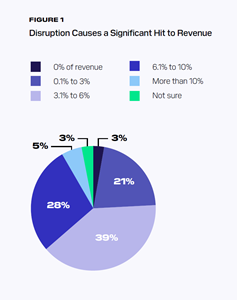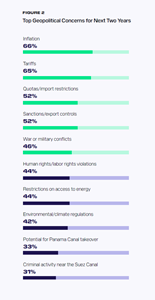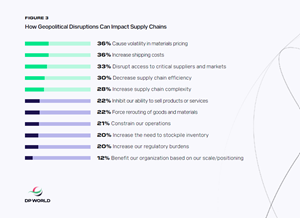DP World Study Finds Supply Chains Underprepared for Geopolitical Risks
82% of supply chain leaders view geopolitical disruption as a major risk, yet only a quarter feel fully prepared
CHARLOTTE, N.C., Nov. 04, 2025 (GLOBE NEWSWIRE) -- A new research report from Supply Chain Dive’s studioID, developed in partnership with DP World, reveals the growing financial and operational toll of geopolitical upheaval on global supply chains — and the strategies most likely to protect companies from disruption.
The report, Navigating Geopolitical Upheaval: Successful Strategies to Deal with Supply Chain Disruption, surveyed more than 150 senior supply chain, operations, and IT executives across North America. Findings show that 82% of leaders view geopolitical events as a moderate to significant risk, and nearly four in five (78%) expect those risks to intensify over the next two years. Yet only one in four feel “very prepared” to manage trade policy changes or new tariffs.
Brittany Caskey, Chief Commercial Officer – Logistics, DP World Americas, said: “Geopolitical shocks are no longer occasional anomalies, they’re an everyday business reality. Five percent median revenue loss from supply chain disruptions is a wake-up call. The companies winning today are those that embed resilience into every decision — from supplier diversification to policy engagement.”
Key insights include:
- Disruption carries a high cost: The median reported revenue loss from supply chain disruption is 5%, with a third of respondents experiencing greater losses.
- Top threats: Inflation (66%) and tariffs (65%) lead the list of geopolitical concerns, followed by import restrictions, sanctions, and military conflict.
- Readiness gap: Just 25% of organizations feel “very prepared” for trade policy changes; half admit they are only “somewhat prepared.”
- Underused but high-impact tactics: The most effective resilience strategies — such as relocating operations for geopolitical advantage, elevating compliance to the board level, and actively influencing policy decisions — are among the least adopted.
- Shifting supply chains: Half of companies are already adjusting supply chains to avoid tariff-impacted countries, while 79% are re-evaluating nearshoring strategies.
- Partnerships matter: 78% of respondents have added or switched providers based on geopolitical advantages of their locations.
The report underscores a new reality: traditional risk playbooks are no longer enough. Organizations that integrate data-driven monitoring, scenario planning, and proactive partnerships are best positioned to transform geopolitical turbulence into competitive advantage.
“Preparedness isn’t just about protecting against risk; it’s about unlocking agility and accelerating your ability to respond and recover from disruption,” Caskey added. “With the right intelligence, infrastructure, and partnerships, supply chains can turn volatility into opportunity.”
The full report, Navigating Geopolitical Upheaval: Successful Strategies to Deal with Supply Chain Disruption, is available for download.
Survey Methodology
DP World partnered with Supply Chain Dive’s studioID to conduct a survey of 152 senior professionals in operations, supply chain, and IT roles across North America. Respondents represented a broad mix of industries, including manufacturing, healthcare, consumer goods, and technology. The survey was conducted approximately two months into the new U.S. presidential administration, amid fresh tariff announcements, providing timely insight into market sentiment and planning.
For more insights into how DP World is reshaping global trade, visit our website: www.dpworld.com
DP World Americas Media Contact:
Melina Vissat, Head of Communications
M: (+1) 704-605-6159
E: melina.vissat@dpworld.com
About DP World
DP World is reshaping the future of global trade to improve lives everywhere. Operating across six continents with a team of over 100,000 employees, we combine global infrastructure and local expertise to deliver seamless supply chain solutions. From Ports and Terminals to Marine Services, Logistics and Technology, we leverage innovation to create better ways to trade, minimizing disruptions from the factory floor to the customer’s door.
In the Americas, DP World operates with a team of over 16,000 people across 12 countries, driving excellence through a robust network of 14 ports and terminals and more than 40 warehouses. By harnessing our global reach and local expertise, we simplify logistics, enhance operational performance, and redefine the boundaries of what’s possible in global trade.
WE MAKE TRADE FLOW.
Photos accompanying this announcement are available at
https://www.globenewswire.com/NewsRoom/AttachmentNg/96eae3f2-1c09-4305-92a1-7914fde94681
https://www.globenewswire.com/NewsRoom/AttachmentNg/3734bd31-7868-41c5-b7e9-21b2bed0d11f
https://www.globenewswire.com/NewsRoom/AttachmentNg/98b6b54f-c410-4803-a894-ce354a6eaacd

Figure 1. Disruption Causes a Significant Hit to Revenue
The survey data leaves no doubt: supply chain disruption is taking a steep toll. With a median revenue loss of 5% and a third of respondents reporting even greater impacts, the cost of inaction is high.
Figure 2. Top Geopolitical Concerns for Next Two Years
When it comes to the top geopolitical concerns, inflation and tariffs ranked No. 1 and No 2., respectively. This was followed by quotas/import restrictions, sanctions/export controls, and war/military conflicts to round out the top five concerns.
Figure 3. How Geopolitical Disruptions Can Impact Supply Chains
Respondents equally rank the biggest impacts of geopolitical disruption as volatility in materials pricing and increased shipping costs. The other top disruption concerns were access to critical suppliers and markets (33%) and decrease supply chain efficiency (30%).
Legal Disclaimer:
EIN Presswire provides this news content "as is" without warranty of any kind. We do not accept any responsibility or liability for the accuracy, content, images, videos, licenses, completeness, legality, or reliability of the information contained in this article. If you have any complaints or copyright issues related to this article, kindly contact the author above.




